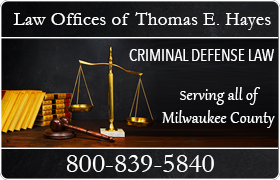South Milwaukee Misdemeanor Lawyer, Wisconsin
Sponsored Law Firm
-
 x
x

Click For More Info:
-
Law Offices of Thomas E. Hayes
161 W Wisconsin Ave Suite 3032 Milwaukee, WI 53203» view mapMilwaukee County Criminal Defense Over 30 Years of Experience
Clients should be comfortable with their lawyer. I am the only one who "works" my cases. My work ethic is efficient result oriented.
800-839-5840
FREE CONSULTATION
CONTACTKathleen A. Lindgren
Labor Law, Family Law, Misdemeanor, Consumer Protection
Status: In Good Standing Licensed: 18 Years
Leonard G. Adent
Family Law, Misdemeanor, Identity Theft, Slip & Fall Accident
Status: In Good Standing Licensed: 57 Years
Richard D. Clough
Real Estate, Workers' Compensation, Misdemeanor, Business
Status: Retired Licensed: 17 Years
Gary R. George
Motor Vehicle, Pension & Benefits, Family Law, Misdemeanor
Status: In Good Standing Licensed: 45 Years
Andrea Friedenauer Hoeschen
Real Estate, Lawsuit & Dispute, Employment, Misdemeanor
Status: In Good Standing Licensed: 28 Years

 Thomas Hayes Milwaukee, WI
Thomas Hayes Milwaukee, WI Contact UsRequest Consultation Now
Contact UsRequest Consultation Now Law OfficeLaw Offices of Thomas E. Hayes
Law OfficeLaw Offices of Thomas E. Hayes
